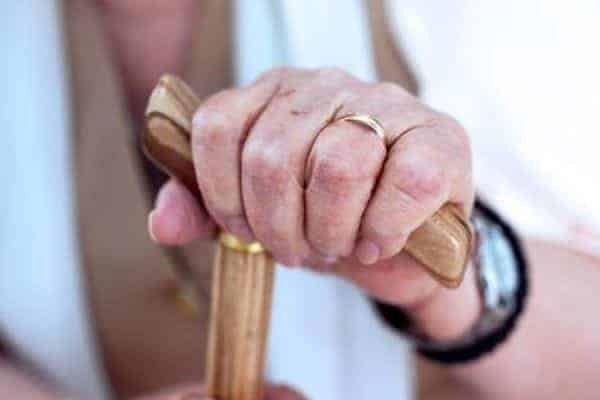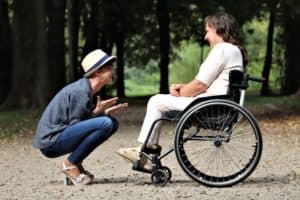Find out more about how caring for a loved one with mobility problems can affect you, and how you can get support with being a carer.
52% of the 13.9 million disabled people in the UK suffer with mobility issues and 45% of pension age adults suffer with a disability according to the charity Scope. Of course many of those people will live independently without the help of a carer. For many households though, family members or friends become carers for their loved ones. The primary reason for needing care may not be the mobility issues, but caring for a loved one with mobility issues certainly has its unique challenges. Let’s look first at the signs someone is struggling with mobility issues…
Signs your loved one is struggling with mobility
Loss of mobility in elderly people can happen suddenly or it can develop slowly. It can be caused by anything from dementia to arthritis, or can be a consequence of long-term illness or previous injury.
When mobility issues develop over time the individual may try to deny it or compensate for it in other ways. However, there are subtle signs that indicate they are struggling and you, as a caregiver or family member, can pick up on these signs in order to help and support them and prevent potential injuries.
1. Frequent falls or stumbles
If you notice that your loved one has started to stumble, trip or fall frequently it could mean there are issues with balance or coordination. This could be caused by dizziness or muscle weakness. Dizziness or wooziness can be a sign of movement problems. It is essential to get help from a health professional as soon as possible as minor falls could lead to serious injury.
2. Difficulty rising from a seated position
Struggling to get up from a chair or out of bed can be a sign of reduced core strength or general muscle weakness. They may become frightened of getting up in case they fall. You may notice they stay in bed longer or refuse to rise from their chair.
3. They take shorter steps
If they walk at a slower pace than usual, or they appear to shuffle with shorter steps and fail to pick up their feet properly this signals mobility problems. This could be due to joint pain, weakness or balance problems.
4. Avoidance of certain activities or places
They may want to avoid steps, taking stairs anywhere, long walks or outings. They may be worried about becoming exhausted or being in too much pain. They may decide to stay at home if moving around has become too strenuous.
5. Trouble with balance or frequent swaying
You may notice them frequently holding on to furniture or walls around the home to stabilise themselves and avoid falling. They may struggle to stand still without swaying a little, or shaking.
6. Increasing fatigue
If your loved one tires easily after completing a basic task like climbing a few stairs or after a short walk this could indicate muscle weakness. The fatigue can discourage them from being active leading to a further decline in mobility.
7. Visible pain or discomfort
Even if they try to hide it, they may show signs of being in pain such as wincing, limping or pausing frequently when walking. This can be a sign of pain in the back, hips or legs. Pain can subtly alter the posture and gait, causing further pain and increasing the risk of falling.
Temporary Disability
If a loved one has a temporary disability, you might want to care for them yourself at your house or their house. You may also want to have additional assistance with home care until your loved one has recovered. The same options are also viable if the mobility issues are long-term and more permanent in-home care solutions might be worth considering. It may also be worth looking into home adjustments that could make things easier, like mobility ramps and doorway widening.
Home Additions and Adjustments for People With Mobility Problems
You may need to adjust the home if your loved one has mobility issues long term. Ramps, doorway widening, raised toilets with bars, lowered counters and other adjustments can all be useful in providing a measure of independence. Devices like walking sticks, walkers, canes and risers are also very helpful in ensuring day to day life is more comfortable.

The Physical Strain
Being a carer brings emotional challenges which are unique to every person experiencing them. Caring for a loved one with mobility problems however comes with additional physical strain. Specially trained carers know how to help people with mobility issues without hurting themselves; they are also physically fit and capable. However, you may be unable to cope with the physical strain even if you are willing to provide care so you may need to get some extra help in the home from a professional.
Getting Help With Mobility Problems
Initially, a carer or family member can assist when mobility issues by, for instance, physically supporting their loved one when moving around but once you notice signs of their failing mobility you should consider helping them get a mobility assessment.
It may be that you are unable to care for your loved one on your own because their mobility issues or healthcare needs are beyond your care abilities. If that is the case, there are lots of places you can go for help, support and advice such as:
- Your GP
- Your social worker, if you have one
- Your loved one’s healthcare team
- Your council
- liveincarehub.co.uk
- Citizens Advice
You may also wish to speak to friends and family to gain additional support and help while seeking a permanent solution.
Caring for a loved one with mobility problems can be challenging and physically hard work, and it is OK to admit that you need some help adjusting to it at the very least. Speak to friends and family, and speak to your GP, get the support you need, you deserve it and it will help you be the best carer you can be to your loved one.



9 Comments. Leave new
That’s great advice as always. I find the information so helpful. thank you.
I agree. Keep the info coming!
I agree. There’s always useful info on these blogs.
Thinking about the future is really important – even for temporary disabilities and there’s some really useful guidance here
Good information!
Great information again, thank you for sharing!!
its definitely worth ensuring you understand what you can get help with – great article thanks
Older people can suffer from muscle loss, a fall in heart health, weight gain and heightened stiffness and lack of mobility in the joints. When you lose fitness in later life, it can be hard to regain but with home care the carer will make every effort to keep the person in their charge as mobile as possible, even if they cannot always get out of the house.
So important to keep moving every day – there are good classes with gentle exercise for older people to help keep you mobile and gain good balance. Balance is so important to avoid falls. Many classes on Zoom so even if you can’t get out of the house you can join in as much as possible. You can do exercises with your carer!